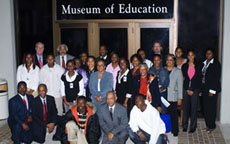

Social Activism and Social Justice |
||||||||||
 Audrey Nabors-Jackson |
“The Lab School made us feel that we could do anything in the world. By going to Southern High, there was always a sense of pride, and the school gave us a feeling that we could be successful in an unjust world.” |
|||||||||
This research project falls within the realm of the “long civil rights movement”—an effort to examine the struggle for civil rights and social justice during the decades before the 1954 Brown v. Board of Education Supreme Court decision. One of the more complex questions that arises in the field of education concerns teachers’ efforts to engage in political and cultural struggle. Black teachers during the 1940s who were members of the NAACP ran the risk of losing their jobs; public statements and actions could have been life-threatening. Even support of unions could cause a teacher to be dismissed, as was the case at the participating Secondary School Study site, Huntington High School. |
||||||||||
|
|
|||||||||
|
||||||||||
|
“Teachers were not involved publicly in the struggle for civil rights. But inside the classroom, students were prepared by our teachers to face racial discrimination with calmness and to stay away from conflict. We were being prepared for a segregated society.” |
|||||||||

an institutional member of the International Coalition of Sites of Conscience
Museumofed@gmail.com




